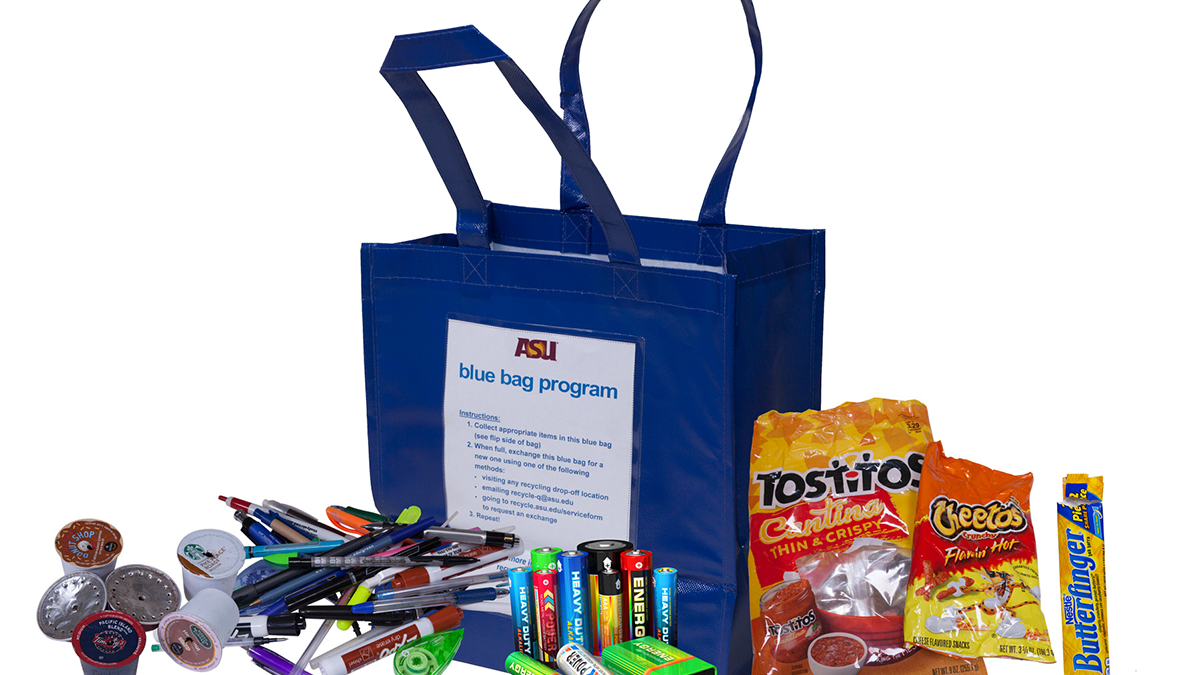ASU blue bag recycling program expands beyond Tempe

The blue bags capture more recyclable items than ASU's extensive blue bin commingled recycling program, which collects plastic, paper, metal and glass.
Sun Devils have more chances to capture landfill-bound waste as the blue bag recycling program extends to the ASU Downtown Phoenix, Polytechnic and West campuses the week of July 4.
The blue bags complement the university’s widespread blue bin commingled recycling program, which currently captures plastic, paper, metal and glass. The five-gallon blue bags are free to any ASU community member to place in university kitchens, break rooms or common areas. The following campus-generated items are blue-bag friendly:
• batteries (dry cell, non-rechargeable)
• coffee pods (one-time use)
• energy bar or candy wrappers
• chip bags
• small eWaste (such as calculators and MP3 players)
• small ink and toner cartridges
• spent pens & markers
• used plastic gift cards
• water filters
The ASU Zero Waste department directs the Blue Bag program. According to Joshua Ellner, Zero Waste program manager, since the January 2015 program launch on the Tempe campus, 540 blue bags placed in 77 buildings have prevented more than 2,500 pounds of material from reaching the landfill.
“We are encouraged by the enthusiasm we have witnessed from the ASU community about this additional waste-diversion program,” Ellner said. “To see the program extend to more ASU campuses is thrilling for our team since every full blue bag brings the university closer to its zero-waste goals.”
ASU defines zero solid waste as a 90 percent reduction in material sent to the landfill from current business-as-usual status. ASU encourages diversion and aversion tactics to meet its zero-waste goals. Waste is averted through reduced consumption and diverted from the landfill via recycling, composting, and reusing or repurposing.
Blue bag basics
A few blue bag items require special care. For instance, single-use coffee pods should be bagged separately from other items since the pods contain small amounts of liquid. The Zero Waste department also recommends dry cell batteries are bagged separately in small plastic baggies or grocery bags. A partnership with ASU Environmental Health and Safety ensures spent batteries are safely processed to reclaim recyclable metals.
The waste collected in blue bags is sorted by hand. Some blue bag items are shipped to New Jersey-based TerraCycle. The company repurposes items from countries around the globe that are problematic to recycle. The materials then are transformed into new products.
Blue bags are collected every week. If users need bags emptied before the regular pickup schedule, the Zero Waste department accepts requests and usually can arrange pickups within a few days.
Request a blue bag via the department’s request form. If you have questions about blue bags, contact the Zero Waste department via email.
More Environment and sustainability

ASU President Michael Crow named to TIME100 Climate list
Arizona State University President Michael Crow has been named to the 2024 TIME100 Climate list of leaders and innovators driving…

Driving green desalination
Wilderness survival TV show hosts, pirates and water treatment researchers agree on one thing: Most natural water sources are not…

ASU preservation facility serves as test bed for rooftop heat mitigation
A roof coating that uses thermal energy storage materials from Arizona State University spinout EnKoat is halting the heat in…